Senate Republicans narrowly advanced President Trump’s tax and spending package, with hopes of passing the legislation by the 4th of July. Following the bill’s advancement, Democrats demanded that the entire 1,000-page bill be read on the floor before a maximum of 20 hours of debate and a multi-hour vote-o-rama leading to final passage from Sunday into Monday.
Two Republicans, Sen. Rand Paul and Thom Tillis, voted against the bill. Sen. Ron Johnson flipped his vote from “no” to “aye,” while Sens. Mike Lee, Rick Scott, and Cynthia Lummis also voted yes.
There was drama in the home stretch as some senators were not present on the Senate floor initially. After some persuasion, the bill moved forward.
Elon Musk criticized the bill, calling it “utterly insane and destructive,” stating that it would harm the country and cause job losses.
Senate Republicans are moving towards an initial vote despite concerns from some GOP Senators. The revised version of President Trump’s tax package includes concessions on state tax deductions, Medicaid policy, and renewable energy provisions.
The bill aims to pass the Senate before Independence Day, but it remains uncertain if all 50 Republican senators will support it. The revised bill addresses concerns on SALT deductions, Medicaid, and renewable energy.
The legislation includes tax relief, Medicaid tweaks, renewable energy rollbacks, and increases in the debt ceiling. The path to final passage is still uncertain, but Senate Republicans are working to unify their ranks and secure a legislative victory for the president.
The updated draft of the bill makes targeted concessions to address concerns from various factions within the GOP. It reflects compromises on social safety net programs and clean energy incentives, serving as a key part of Trump’s economic agenda for his second term.
Majority Leader John Thune announced that voting on the bill would begin soon, with a final vote expected shortly afterward. If passed, House members will be called back to Washington for final approval.
Despite some internal divisions, Senate Republicans are optimistic that the new concessions in the bill will be enough to unite their ranks and achieve a legislative victory.

